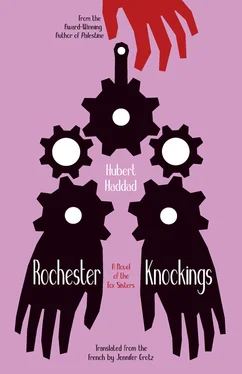“Oh!” she said, frightened. “You are very funny, Mister Splitfoot, perched in my lap like that.”
“I don’t weigh that much, Katie darling!”
“Oh! oh! Mister Splitfoot, how I’ll miss you!”
“Don’t worry about anything, Katie, spirit’s blood, I’m waiting for you under the light scarves.”
In the Bellevue Hospital emergency room, a doctor on call casually noted the death of the incoming patient and crossed himself just in case.
“What should we do with her?” he asked the service nurses.
“No paperwork, she’s homeless, probably an immigrant escaping scurvy or typhus who caught cholera instead.”
To ward off the risk of an epidemic, the corpse was not sent to the anatomical theater. It was delivered to the gravediggers, who for compensation hardly got anything more than the gold or silver teeth and, on rare occasions, a little furtive affection. They made a pile of other remains at the bottom of a trench and covered them all with quicklime. Was it at Woodlawn Cemetery? Though hardly consoling, the common grave does accomplish the ideal community. And the morning dew passes for human memory. One marvels at the hardened mortals who swear that their minutes have the weight of turnips and squash blooming in their garden!
A few months later, in a funereal intoxication, Margaret Fox dreamt so strongly of her little sister that it killed her, her body rotten with lethal ulcerations. Lacking resources or identity, she too had a common burial.
Thus ended — as precisely as the concentrated work of mediums in these pages would allow it — the uplifting and pathetic adventure of the Fox Sisters.
No one will ever meditate or dance on their remains. Who ever takes the time to bow over a mass grave?
Good-bye my Fancy!
Farewell dear mate, dear love!
I’m going away, I know not where,
Or to what fortune, or whether I may ever see you again,
So Good-bye my Fancy.
Now for my last — let me look back a moment. .
— Walt Whitman
Behind the wheel of a Panhard-Levassor with a two-cylinder engine, whose original owner had passed away, Pearl Gascoigne quickly developed the taste for speed. The whole way from Rochester to Hydesville, they had only passed one other automobile, an Auburn looking like a luxurious carriage, and a few fiacres and peasant carts. The road, in the process of being asphalted, crossed or ran alongside the railway tracks several times, but they saw no locomotive.
“Don’t forget that you’re driving with a thirty-six horsepower engine!” William Pill was frightened. “Would you like me to drive?”
“No!” Pearl replied. “It’s too exhilarating. .”
“Well, slow down then. You’re going at least twenty-five miles per hour on the uphill slopes!”
They reached their destination in the early afternoon, under a cold sun white as snow. It was a sharp day in April, bright, with an Eastern wind carrying a marine taste. Several kinds of fruit trees were already in bloom after the early start of the season. The outskirts of Hydesville seemed unrecognizable to them. They had expanded the roads, drained ponds, erected electric power lines, and built a water tower, stone houses, and a rather beautiful building that must have been a school.
The automobile having reached the center of town, Pearl missed a gear-shift and nearly ran over a procession of geese, with other animal witnesses — goats, pigs, dogs — scattering out of the way at the first sounds of backfire. Two horses hitched to a drugstore railing flinched and whinnied. Children wild with joy ran by the dozens and circled around once Pill managed to apply the brake. Housewives curious about the uproar leaned out of windows. Several of the regulars came out from the saloon with laughing faces, legs spread as if standing on a ship’s deck.
Pearl took off her leather cap and goggles under the amazed eyes of the farmers, who had certainly never seen an elderly woman so pretty and determined in her kidskin boots, with thick, milk-colored hair, and a delicately drawn face and eyes of an almost alarming clarity. The solid old man who accompanied her, barely stooped in his suit, looking like a rich farmer or circus director, aroused vague suspicions among the elders without being able to translate them into memories. A grandfather leaning on his cane, which was quite useful upon leaving the bar, stepped in front of the car, with a look that seemed to say, “Now that is an automobile!” Then he raised his stubbly chin toward this interesting bourgeois couple.
“It seems to me, sir,” he began while rubbing his hand over his forehead, “I have the impression. . Well, it wouldn’t surprise me if, sometime, that we’d met before. .”
“Of course!” the other answered while lighting a cigarillo. “But it was well before the Great Depression, the strikes, the invention of the automobile, the Civil War. .”
“In those days, I was a man of the law, just in this lost hole of a place. .”
“And I, the professional player, passing through here rather often. .”
“ The Faker! ” belched the man, leaning into his cane. “So it’s you, William Pill!”
“Alive and well, Marshall McLeann!”
The latter, barely recovered, gave a polished wink to Pearl, who, wet-eyed, was studying every detail of each wooden façade.
“Is that your wife?” he whispered.
Pill let out a laugh and, after a slightly annoyed gesture of denial, thumbs in his pockets, took on an air of importance.
“Enough of widows and orphans! Let’s be serious: what’s going on these days aside from the bullet dance between the bumpkins and the ranchers?”
“Bah, my goodness, fields are still fields and whiskey’s the same color! There’s a little bit of tourism now, because of the Fox sisters’ farmhouse being under construction over there. Getting some big ideas in his head from folks in town, the mayor dreams of making some kind of monument. .”
Seized with emotion, Pearl drew away in small steps toward the church. Partly rebuilt and repainted, but identical, with its fretted awnings, its slate steeple above the roofs, it reminded her of nothing happy. The reverend had long terrorized his world every Sunday with his granite faith and the rigors of a morality worked over by remorse. She only glanced at the adjoining house, to the narrow window of her bedroom, at the empty room on the ground floor where she used to teach her class. Eyes closed for a moment, she turned quickly back to find the main road, followed closely by two mischievous little girls and a small dog with a black muzzle.
William Pill was waiting for her, seated behind the wheel of the Panhard. Through the smoke of his cigarillo, he smiled at all these years that had passed by more quickly than a single day of his childhood. Now established in the good city of Rochester, he had put away at the bottom of an armoire the trappings of Mac Orpheus and lived off his private income, as sanely as possible. Pearl had never wanted him at her place among her things, too busy making war with the country’s institutions or writings stories to make you fall asleep standing up. So refined, dismayed over a broken glass, she also found him more cumbersome than a carnivorous bison. But he had only settled in Rochester with the idea of sharing a few happy hours with her — incandescent memories, a good dinner, long walks along the shore of Lake Ontario — with no declared motives other than to be at her service, from time to time, like for this stunning pilgrimage to Hydesville. There’s nothing picturesque to see here, really, in this damn countryside, where he’d on more than one occasion barely missed being hanged or lynched!
Читать дальше












